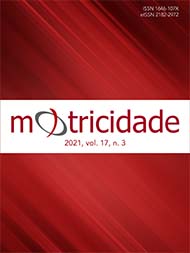Effects of Age and Experience on the Development of Aquatic Competence in Children Aged 36 to 72 Months
DOI:
https://doi.org/10.6063/motricidade.24096Keywords:
restrições, crianças, competência aquáticaAbstract
Considering age and experience as possible constraints to the development of aquatic skills, this study sought to analyse the effect of both on the aquatic competence of 368 children aged between 36 and 72 months using the Erbaugh Scale. Children were categorised according to age and previous aquatic experience in swimming lessons. The results of the two-factor ANOVA indicate that aquatic competence values increase from the lowest to the highest age group and the values found for the different levels of experience in swimming lessons. A regression model was applied and proved to be significant. According to the model, age and previous aquatic experience together were responsible for explaining 46% of the variance in aquatic competence. When applied in each group, the regression analysis indicated that age starts to exert less influence and the experience a greater influence on aquatic competence the older the age groups become. In addition, as the experience increases, the difference in aquatic competence increases between older and younger children. Therefore, the analysis of the contribution of these variables allows professionals to be guided in planning teaching strategies for the development of aquatic competence.
Keywords: constraints, children, aquatic competence.
Downloads
Published
Issue
Section
License
The authors of submitted manuscripts must transfer the full copyright to Journal Motricidade / Sílabas Didáticas Editions. Granting copyright permission allows the publication and dissemination of the article in printed or electronic formats, and copyrights start at the moment the manuscript is accepted for publication. It also allows Journal Motricidade to use and commercialise the article in terms of licensing, lending or selling its content to indexation/abstracts databases and other entities.
According to the terms of the Creative Commons licence, authors may reproduce a reasonable number of copies for personal or professional purposes, but without any economic gain. SHERPA/RoMEO allows authors to post a final digital copy (post-printing version) of the article on their websites or on their institutions' scientific repository.


